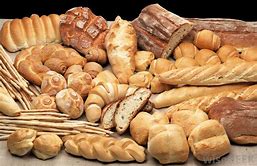 |
EQUIPMENT FOR YOUR BREAD BAKINGCopyright © 2004 Carol Stevens, Shaboom's Kitchen, All Rights ReservedIf you look through baking catalogues, cookware web sites, gourmet kitchen shops, and cookbooks, you may get the idea that, in order to bake a couple of simple loaves of bread, you will need a fortune in $$ to buy everything they tell you you absolutely need.
What I present here is what is absolutely necessary; then what is nice to have. I'll also try to describe for you substitutes wherever there are some that are usable (they're not for everyone, though).
You will note that I do not discuss Bread Machines. I guess I'm from the "old school" where doing it by hand it always the best.
NECESSARY
- A large mixing bowl, preferably non-metallic, that will hold a fully-risen dough ball about the size of a basketball. Stoneware, glass or acrylic is fine.
- A Medium bowl and a small bowl, again preferably non-metallic, for preparing mixtures to add to the final dough.
- A large long-handled spoon, preferably wood or metal, for mixing; it should be about 12-14 inches long. Plastic has a tendancy to snap when mixing higher gluten flours.
- Measuring cups: At least one for liquid ingredient measurments up to 2 cups; One complete metal or plastic set for dry ingredient measurments of 1/4 cup, 1/3 cup, 1/2 cup and 1 cup.
- Measuring spoons: One complete metal or plastic set for measurements of 1/8 tsp., 1/4 tsp., 1/2 tsp., 1 tsp., and 1 tbsp.
- Plastic bowl scraper to effectively scoop a large risen ball of dough out of the mixing bowl. This is particularly effective when making artisan breads that should not be deflated too much. Hey, they're really cheap!
- A stainless steel bench knife to divide risen dough evenly into loaves, buns or rolls, etc.
- Plastic wrap to cover the bowl when fermenting your dough. Hey, buy cheap! I use Stretch-Tite---500 feet for around $6.
- Baking Pans:
- At least two for 1-pound loaves - 8-1/2" x 4-1/2".
- At least two for 1-1/2 pound loaves - 9" x 5".
- At least one baking pan (jelly roll pan) 15" x 10".- Spray oil or PAM, either olive oil or vegetable oil, to oil the bowl you ferment your dough in, and sometimes to spray plastic wrap to cover proofing loaves.
- Potholders: At least 2 heavy insulated potholders and/or mitts.
- Kitchen towels: At least 2, preferably made from flour-sacking.
- Single-edge razor or very sharp small knife for slashing artisan-type loaves.
- Good-quality heavy serrated knife for slicing finished loaves. (Wusthof or Henckels is best and worth the $$.)
- Large cannister for storage of at least five pounds of flour. (I use ClickClacks.)
NICE TO HAVE
- Bread Board (Tavolini) at least 16" x 20", preferably with front and back ledges to keep the board from slipping.
- Baking stone or baking tiles good up to 550º F. especially for artisan breads and pizzas.
- Large electric stand mixer, especially for working with high-gluten flours.
- Sil-Pat or parchment Paper to line large baking sheets.
- Two- or three-part perforated non-stick baking pans for Italian bread or French baguettes.
- Lame for slashing tops of artisan-type loaves
- Heavy linen couche for proofing baguettes and other "wet" doughs.
- Proofing bucket
- Proof cover (I bought a plastic storage box at Wal-Mart for $6!)
- Kitchen scale for accurate measurements, especially of flour and water.
- Stainless steel air-tight container to yeast storage
Come on---Browse Around---Let's Bake Some Bread!
(Click on the title)Different Flours: Why King Arthur's Flour is Best
Equipment
The Process
Hearth Bread Baking
Troubleshooting
Sourdough and Starters
My Favorite Yeast Bread Recipes
My Favorite Quick Bread Recipes
Where I buy my "Stuff"
Round Table Member Bread Photos
Special! Pan De Campo by Dr. John Raven
Another Special! Wingboy's Lovely Hole-y Bread
One More Special! Special! Breadbakered's Crocodile Bread
Back to My Breadbox
Back to my Kitchen Front Page